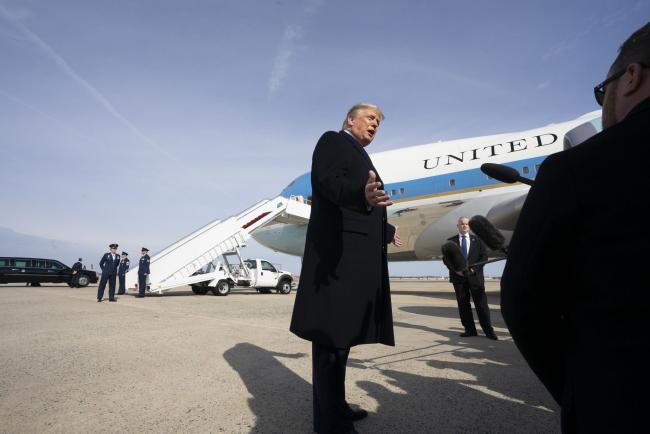This post was originally published on this site
https://i-invdn-com.akamaized.net/content/pice3289dde5573e0e5caef3af4f269573d.jpg
(Bloomberg) — Donald Trump is on the defensive in Arizona, where he’s set to rally voters on Wednesday as an influx of new residents challenge the president’s hold on the Republican-dominated state.
Arizona’s expanding state economy and low unemployment should help Trump in a state he won by more than 3 percentage points in 2016, but there are significant warning signs for the president.
Democrat Kyrsten Sinema beat Republican Martha McSally for an open U.S. Senate seat in 2018. This year, a popular Democrat is running ahead in polls for the state’s other Senate seat, which could bolster turnout among party voters. A handful of polls in recent months have shown Trump running roughly even with Joe Biden and beating several other Democrats.
Trump’s decision to visit Phoenix on Wednesday shows his campaign is worried about Arizona becoming a swing state. The Trump campaign didn’t respond to a request for comment.
Nationally, a recent Gallup poll found Trump’s approval rating to be the highest of his presidency, but surveys matching him up against top Democrats show them edging him out.
Arizona has been among the fastest growing states, threatening the GOP’s dominance. As of July 1, 2019, the U.S. Census Bureau estimated there were 7,278,717 residents, up 4.8% from July 2016.
The number of minorities, especially Hispanics, has been increasing and some estimates suggest that minorities will be in the majority by 2030. Minority voters are more likely to support Democrats.
Even some state Republican leaders and strategists said the state is up for grabs and that the outcome will depend in part on who Democrats pick as their nominee.
“Arizona is going to be in the limelight,” said George Khalaf, a Republican pollster and strategist. “No one is going to take Arizona for granted. If you’re on the left, it’s not a slam dunk, if you’re a Republican, you don’t want to take it for granted.”
Republicans command about 35% of the state’s registered voters, ahead of Democrats, who make up 31%. But there’s a big wild card: 33% of voters are registered as independents.
The state, long known for its conservative politics and for electing Republicans like Barry Goldwater and John McCain, has voted for Democrats in only eight presidential elections since 1912. But in recent years Arizonans have shown an increasing willingness to elect Democratic candidates.
In the Senate race two years ago, Sinema won even as Arizona’s Republican Governor Doug Ducey was re-elected. Three other Democratic women won statewide office in that election.
In December 2018, McSally was appointed to the senate seat that had been held by McCain, who died earlier that year. She’ll be on the ballot again in November and polls show her trailing Mark Kelly, a Democrat, former astronaut and husband of former U.S. Representative Gabby Giffords.
The state’s economy is doing well, but isn’t among the top performers.
Real gross domestic product growth in Arizona was 13th in the nation at 2.4% in the third quarter of 2019, government data show. That’s a slowdown from 5.4% a year earlier, mirroring the broader economy that’s coming down from 2018 levels.
Arizona’s unemployment rate has tightened, falling to 4.6% in December from 5.2% in January 2017 when Trump was inaugurated. Still, the present unemployment rate is among the highest in the nation.
One of the most important counties to Trump’s re-election prospects is Maricopa, which includes Phoenix, the location of Trump’s rally. The county, which has been the fastest growing in the country for several years, accounts for 61% of Arizona’s registered voters.
Chuck Coughlin, an Arizona-based Republican strategist, said the state is crucial to the GOP’s election strategy. “I don’t think there’s a scenario in which they lose Arizona and win the White House,” he said.
Voters who oppose Trump were trying to make their voices heard on Tuesday in advance of his arrival.
Rally Stirs Both Parties
Fred Bauer, 67, was among a group of about a dozen people gathered at a busy Phoenix intersection, holding signs that included slogans like “Anyone but Trump 2020.”
Bauer says that he’s originally from Chicago, but he bounced around the U.S. and abroad, last working in California, before he and his wife moved to Phoenix four years ago. Bauer, who said he supported President Ronald Reagan in the 1980s, considered himself an independent until Trump’s election.
“You can start with how he denigrates people from Muslims to people of color to sexual orientation to football players,” Bauer said. “He’s not working to bring people together. I don’t think tariffs have had a positive effect. Foreign policy is a hotbed.”
Rae Chornenky, chairman of the Maricopa County Republican party, expects a tough fight. She said Trump’s rally was helping to generate enthusiasm.
“I can’t keep up with the people who are contacting us saying, ‘I want to do something, how can I help?’” Chornenky said. “I’ve never seen this much of an influx of that.”
(Michael Bloomberg is seeking the Democratic presidential nomination. Bloomberg is the founder and majority owner of Bloomberg LP, the parent company of Bloomberg News.)
(Corrects spelling of Sinema’s first name in third paragraph.)

